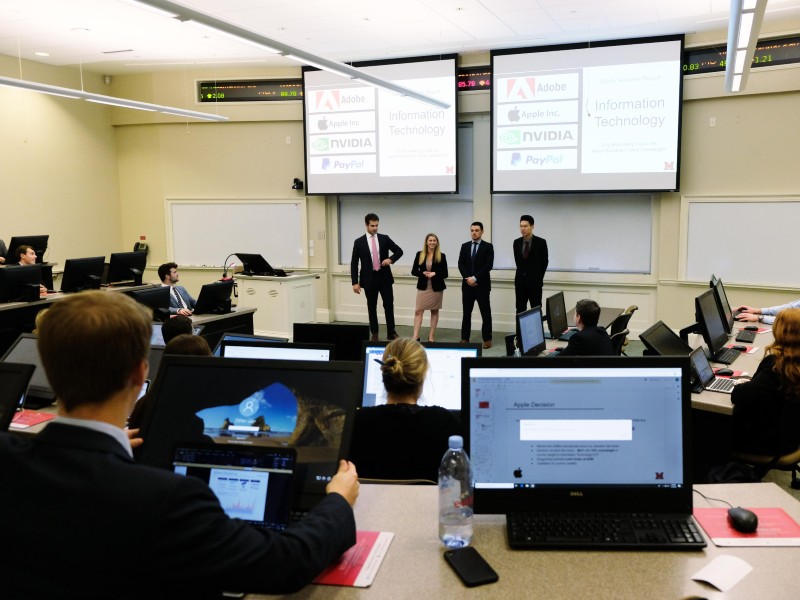
Stock Pitch Competition
Program Information:
Registration – March 6
To participate in the competition, interested teams must register by the end of the day on March 6. Please include all requested information for all team members when registering. The registration form can be found here.
First Round (non-Miami teams):
March 25 – The first round will consist of students selecting and analyzing a long or short investment idea in the form of a written proposal. All presentations are to be submitted in PowerPoint format with no more than 20 slides. Email a summary of your conclusions and supporting analysis (PowerPoint) to Tom Boulton (boultotj@miamioh.edu) no later than 5:00 PM. Late submissions will be disqualified. Ideas will be judged on the quality of the investment pick and the rationale.
March 27 – The finalists will be announced and advance to the in-person intercollegiate competition to be held April 9-10 in Oxford, Ohio.
First Round (Miami teams):
March 18 – The first round will consist of students selecting and analyzing a long or short investment idea in the form of a written proposal. All presentations are to be submitted in PowerPoint format with no more than 20 slides. Email a summary of your conclusions and supporting analysis (PowerPoint) to Tom Boulton (boultotj@miamioh.edu) no later than 5 p.m.. Late submissions will be disqualified. Ideas will be judged on the quality of the investment pick and the rationale.
March 26 – Miami finalist teams will be announced and advance to the Miami finals to be held virtually on April 9-10.
April 6 – Finalist teams will make a ten minute Zoom presentation of their analysis followed by a ten minute question and answer session. The top team(s) will be announced and advance to the in-person intercollegiate competition to be held on April 9-10.
Investment Symposium and Intercollegiate Competition – April 9-10
Top teams from Miami and other universities are invited to Oxford, Ohio for the in-person finals and investment symposium at the Farmer School of Business. On Thursday, April 9, Cleveland Research Company will host a dinner for student finalists and other investment professionals. Friday, April 10 will begin with an investment symposium in the morning, followed by lunch and additional networking opportunities. Friday afternoon, the finals will be held in person and judged by Cleveland Research Company. Finalists will make a ten minute in person presentation of their analysis followed by a ten minute question and answer session. Presentations will be judged on the quality of the investment pick and rationale, the quality of the presentation, and the ability to field questions. The winner and runner-up will be announced Friday afternoon, immediately following the presentations.
Thursday, April 9 – Welcome Dinner For Finalists
Time: 6-8 p.m.
Friday, April 10 – Stock Pitch Competition and Investment Symposium
All students are welcome to attend.
Time: 9 a.m.-3:30 p.m.
Location: Miami University Farmer School of Business
Address: 83 N. Patterson Avenue, Oxford, OH 45056
Parking: North Campus Garage, 645 E. Withrow Street, Oxford, OH 45056
9:15–10:30 a.m. – Stock Pitches
10:30 a.m.–12:25 p.m. – Investment Symposium
12:30–1 p.m. – Lunch for speakers, judges, and finalists
1–2:30 p.m. – Stock Pitches
3–3:30 p.m. – Final Q&A, Awards
 John Budig is a primary strategies analyst with Alyeska, where he joined in 2016. Alyeska is a Chicago-based hedge fund. Prior to joining, John was an Associate at Goldman Sachs in their Investment Banking Division where he covered financial institutions, including Depositories, Specialty Finance, and Asset Managers. John graduated with honors summa cum laude from Miami University in 2011, with a B.S. in Finance and a minor in Decision Sciences. John is from Cincinnati, OH and has two children with his wife, Elizabeth, who is also a graduate of Miami University.
John Budig is a primary strategies analyst with Alyeska, where he joined in 2016. Alyeska is a Chicago-based hedge fund. Prior to joining, John was an Associate at Goldman Sachs in their Investment Banking Division where he covered financial institutions, including Depositories, Specialty Finance, and Asset Managers. John graduated with honors summa cum laude from Miami University in 2011, with a B.S. in Finance and a minor in Decision Sciences. John is from Cincinnati, OH and has two children with his wife, Elizabeth, who is also a graduate of Miami University.
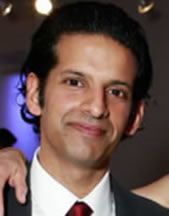 Neal Chandoke is a Portfolio Manager and founding member with Night Squared, a NY-based hedge fund, which he joined in 2024. Neal focuses on the consumer sector. Prior to joining, Neal held various investment roles at Millennium, J Goldman, and Point72. Neal earned his Bachelor of Science in Business Administration (BSBA) from the University of North Carolina at Chapel Hill in 2003. Neal has family in Cincinnati, Ohio, and presently resides in New York.
Neal Chandoke is a Portfolio Manager and founding member with Night Squared, a NY-based hedge fund, which he joined in 2024. Neal focuses on the consumer sector. Prior to joining, Neal held various investment roles at Millennium, J Goldman, and Point72. Neal earned his Bachelor of Science in Business Administration (BSBA) from the University of North Carolina at Chapel Hill in 2003. Neal has family in Cincinnati, Ohio, and presently resides in New York.
 Wes Tang-Wymer is co-founder of Room40, a multi-strategy crypto investment firm. Prior to Room40, Wes was a founding team member of SoftBank Group and SoftBank Vision Fund, where he invested in a broad range of growth and late-stage technology companies ranging from SoFi to Uber. Before SoftBank, he was a long/short equities investment analyst at Point72 covering technology, media, and telecom. Wes began his career as an investment banking analyst at Morgan Stanley. A Cincinnati native, Wes graduated from Miami University in 2011 with a B.S. in Finance and Accountancy with a minor in Economics.
Wes Tang-Wymer is co-founder of Room40, a multi-strategy crypto investment firm. Prior to Room40, Wes was a founding team member of SoftBank Group and SoftBank Vision Fund, where he invested in a broad range of growth and late-stage technology companies ranging from SoFi to Uber. Before SoftBank, he was a long/short equities investment analyst at Point72 covering technology, media, and telecom. Wes began his career as an investment banking analyst at Morgan Stanley. A Cincinnati native, Wes graduated from Miami University in 2011 with a B.S. in Finance and Accountancy with a minor in Economics.
 Adam Uhlman is head of Investor Relations at Mettler Toledo. Previously, Adam spent over 15 years at Cleveland Research Company, an independent equity and market research firm, where he provided detailed research, analysis, and financial models on industrial companies as the industrial sector head. Adam holds a bachelor’s degree in economics from Ohio Wesleyan University. Adam resides in Columbus, Ohio, and has two daughters with his wife Mikaela.
Adam Uhlman is head of Investor Relations at Mettler Toledo. Previously, Adam spent over 15 years at Cleveland Research Company, an independent equity and market research firm, where he provided detailed research, analysis, and financial models on industrial companies as the industrial sector head. Adam holds a bachelor’s degree in economics from Ohio Wesleyan University. Adam resides in Columbus, Ohio, and has two daughters with his wife Mikaela.
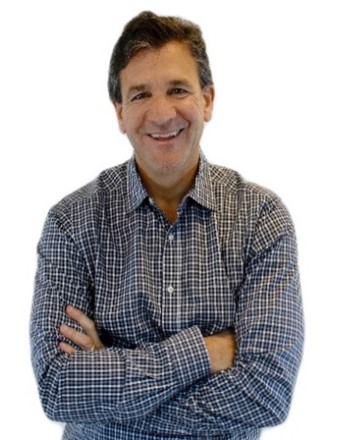 Chris Byke is the President and Director of Research Sales for Cleveland Research Company. Chris is one of two founders who launched Cleveland Research Company in June 2006. Prior to Cleveland Research, Chris was part of a small group that founded Midwest Research in 1996. Prior to launching Midwest Research, Chris spent time at Roulston and Company from 1991-1996 in a Trading and Institutional Sales role. Chris received a BA from Baldwin-Wallace College (1988) and his MBA from Case Western Reserve (1993). Chris and his wife Laurie have three children, two of whom are graduates of Miami University.
Chris Byke is the President and Director of Research Sales for Cleveland Research Company. Chris is one of two founders who launched Cleveland Research Company in June 2006. Prior to Cleveland Research, Chris was part of a small group that founded Midwest Research in 1996. Prior to launching Midwest Research, Chris spent time at Roulston and Company from 1991-1996 in a Trading and Institutional Sales role. Chris received a BA from Baldwin-Wallace College (1988) and his MBA from Case Western Reserve (1993). Chris and his wife Laurie have three children, two of whom are graduates of Miami University.
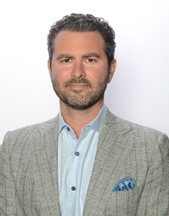 Vince Ciepiel, CFA, is a Senior Analyst and Partner at Cleveland Research Company (CRC), an independent equity research firm. Vince leads CRC’s travel and luxury research team, with a focus on hotels, cruises, online travel agencies, and luxury brands. Vince graduated summa cum laude from Miami University in 2011 with a concentration in Finance and Statistics. Prior to joining CRC, Vince worked in New York for an Investment Bank and a Hedge Fund. Vince lives in Cleveland, OH, and has three children with his wife, Karolina, who is also a graduate of Miami University.
Vince Ciepiel, CFA, is a Senior Analyst and Partner at Cleveland Research Company (CRC), an independent equity research firm. Vince leads CRC’s travel and luxury research team, with a focus on hotels, cruises, online travel agencies, and luxury brands. Vince graduated summa cum laude from Miami University in 2011 with a concentration in Finance and Statistics. Prior to joining CRC, Vince worked in New York for an Investment Bank and a Hedge Fund. Vince lives in Cleveland, OH, and has three children with his wife, Karolina, who is also a graduate of Miami University.
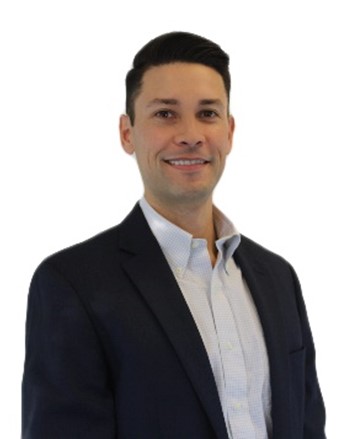 John Selio joined Cleveland Research in 2016 and currently covers the pet specialty, mass, eCommerce, grocery, value, and club channels. Through regular conversations with industry professionals, his team uncovers inflection points and communicates best practices for how suppliers and retailers deal with their most challenging issues. John has over 1,000 conversations a year with many of the industry’s thought leaders and enjoys aggregating the most relevant data points to tell a story of where the retail market is heading. John attended Miami University and currently lives in Cleveland, OH, and has three children with his wife Sami, who is also a graduate of Miami University.
John Selio joined Cleveland Research in 2016 and currently covers the pet specialty, mass, eCommerce, grocery, value, and club channels. Through regular conversations with industry professionals, his team uncovers inflection points and communicates best practices for how suppliers and retailers deal with their most challenging issues. John has over 1,000 conversations a year with many of the industry’s thought leaders and enjoys aggregating the most relevant data points to tell a story of where the retail market is heading. John attended Miami University and currently lives in Cleveland, OH, and has three children with his wife Sami, who is also a graduate of Miami University.
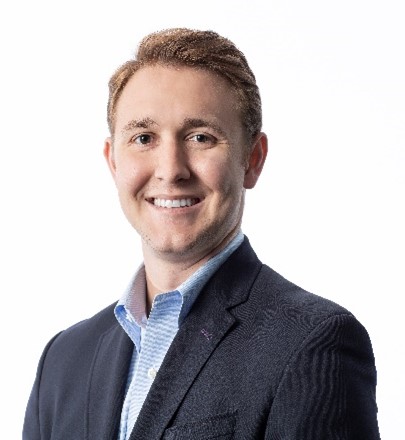 Ryan Miller is a Research Analyst and Partner with Cleveland Research Company focused on the hardline retailers, homebuilders, and building products industry. Prior to joining CRC, Ryan interned with J.P. Morgan. Ryan graduated from Miami University with a degree in Finance in 2017 where he was a former student-athlete and also participated in the Miami study abroad program in Luxembourg. He currently resides in Cleveland.
Ryan Miller is a Research Analyst and Partner with Cleveland Research Company focused on the hardline retailers, homebuilders, and building products industry. Prior to joining CRC, Ryan interned with J.P. Morgan. Ryan graduated from Miami University with a degree in Finance in 2017 where he was a former student-athlete and also participated in the Miami study abroad program in Luxembourg. He currently resides in Cleveland.
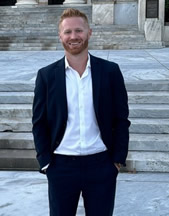 Joey Comisford is a member of Cleveland Research’s Equity Research Sales Team, focusing on multi-strategy institutional hedge funds. Prior to joining CRC, Joey spent several years in operations and international sales in the architectural/interior design industry. Joey graduated cum laude from Miami University in 2016 with a Marketing degree from the Farmer School of Business where he was also an all-conference performer for the Men’s Track and Field team. Joey lives in downtown Cleveland with his fiancé Allison, who is also a graduate of Miami University.
Joey Comisford is a member of Cleveland Research’s Equity Research Sales Team, focusing on multi-strategy institutional hedge funds. Prior to joining CRC, Joey spent several years in operations and international sales in the architectural/interior design industry. Joey graduated cum laude from Miami University in 2016 with a Marketing degree from the Farmer School of Business where he was also an all-conference performer for the Men’s Track and Field team. Joey lives in downtown Cleveland with his fiancé Allison, who is also a graduate of Miami University.
Recommended Presentation Components (more detail below)
- State a clear investment thesis and identify the key catalysts for the business/stock
- Analyze the business model and key drivers
- Evaluate the industry and competition
- Evaluate the potential risks to the investment thesis/idea
- Utilize fundamental analysis and provide a price target
Sponsor
Contact
Dr. Tom Boulton boultotj@MiamiOH.edu
Recommended Preparation
It is hard to find a “mispriced” stock – as there is a lot of money chasing that! This is a difficult project, and we evaluate the presentations with that in mind. Included below are the questions that we often ask. Successful teams historically have answered these questions well.
- Stock chart over last 10, 5, 2 years vs. the market – Why has the stock over or underperformed?
- P/E or EV/EBITDA multiple over the last 10, 5, 2 years
- What as the multiple done (expanded, contracted, stayed the same) over the last couple of years? What company or industry specific factors could be causing those changes? How do the changes compare to peers?
- Has the company grown earnings over the last 10, 5, 2 years? By how much? What do consensus estimates suggest how much EBITDA and EPS should grow this year? Over the next few years?
- Has this company beat or missed earnings the last few years/quarters? Did the stock react negatively or positively to those releases? What do you think drove the reaction?
- On the last earnings call transcript, on what did analyst questions focus? Analyst questions often represent what investors are watching or are skeptical of. What questions addressed the core trajectory of fundamentals in the business (i.e. are things getting better or worse in the industry in general and the company specifically)? Did management response seem to adequately address this?
- In the 10-K management discussion and analysis:
- What industry does the company compete in? Who are its peers? What does management believe the company’s competitive advantages or differentiating factors are? Do these seem reasonable?
- What are the factors driving your revenue assumptions? Are your revenue growth assumptions more or less bullish than consensus and why?
- How does the company’s growth compare to what’s expected in the industry? Are they gaining or losing market share?
- Do you expect margins to expand or contract this year and next? What is driving that assumption (Price growth? Input cost changes? Other factors?)
- Bringing together your revenue and margin assumptions, what EPS and EBITDA can the company generate this year? Next year? How does that compare to current consensus estimates? (i.e. if you are pitching a long, you should be ahead of consensus; if short, probably below)
- What are two or three company specific or industry catalysts that could cause the market to better understand and price this stock? When will these occur? How will this manifest themselves in numbers?
- Why isn’t the market correctly valuing these catalysts? What does the market not understand?
- What are people in the industry saying about these catalysts and this company?
- What do you expect the company to say on the next earnings call? How will the stock likely react to this?
- We see X% upside/downside to company XYZ over the next x months
- Three catalysts which will drive that & what the market doesn’t understand
- Company description
- Industry overview
- Catalyst 1
- Catalyst 2
- Catalyst 3
- Earnings assumptions vs. consensus – why different?
- Valuation (comps – EV/EBITDA, P/E vs. peers, DCF)
- Risks/mitigating factors
- Final recommendation
- Investor Relation Website – Earnings Press Releases, Call Transcripts/Webcasts, Company Investor Presentations
- gov – Company Filings (10-Ks and 10-Qs)
- Bloomberg – Company and Industry News, Equity Research Reports, Peer Group, Financials